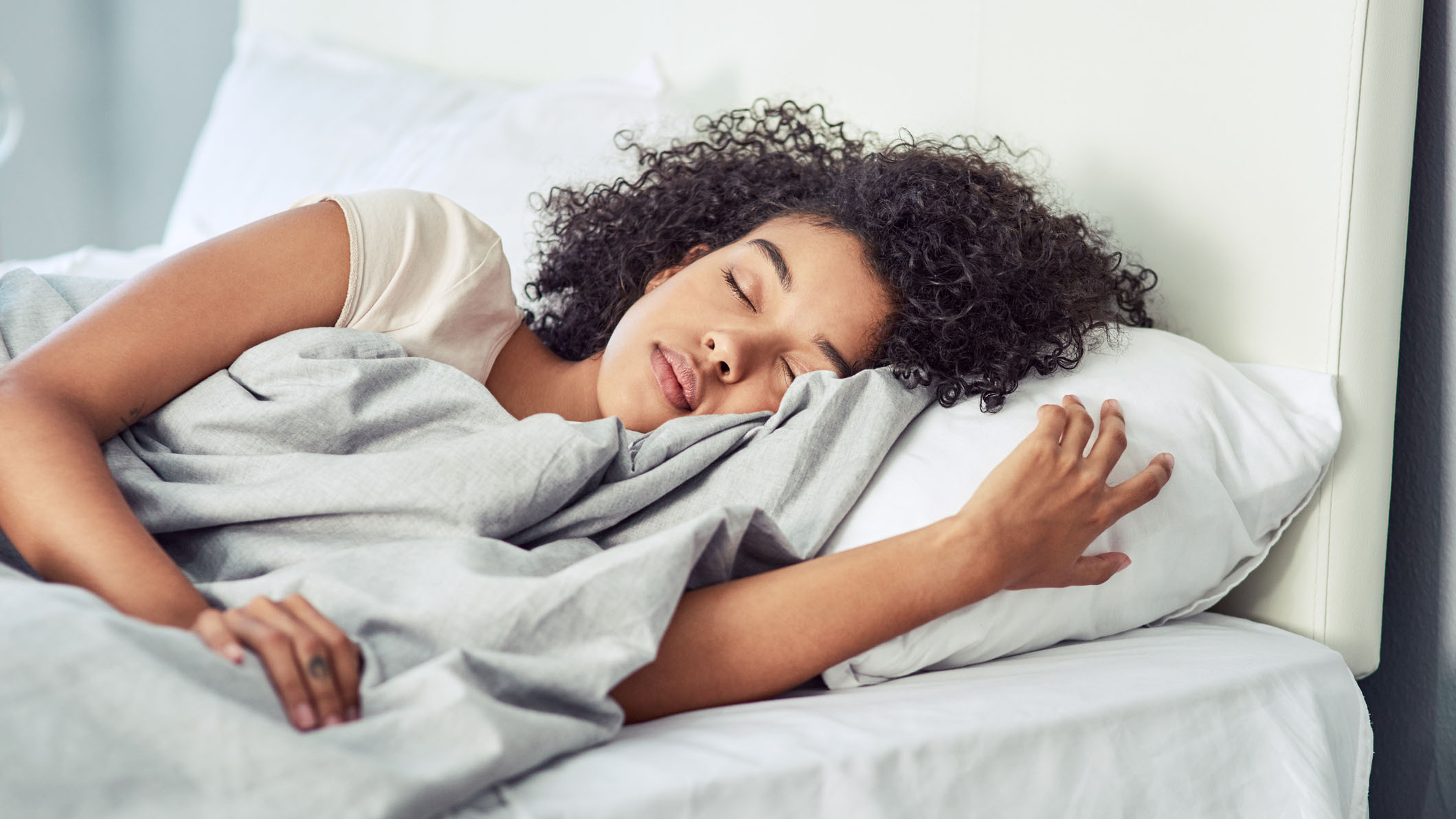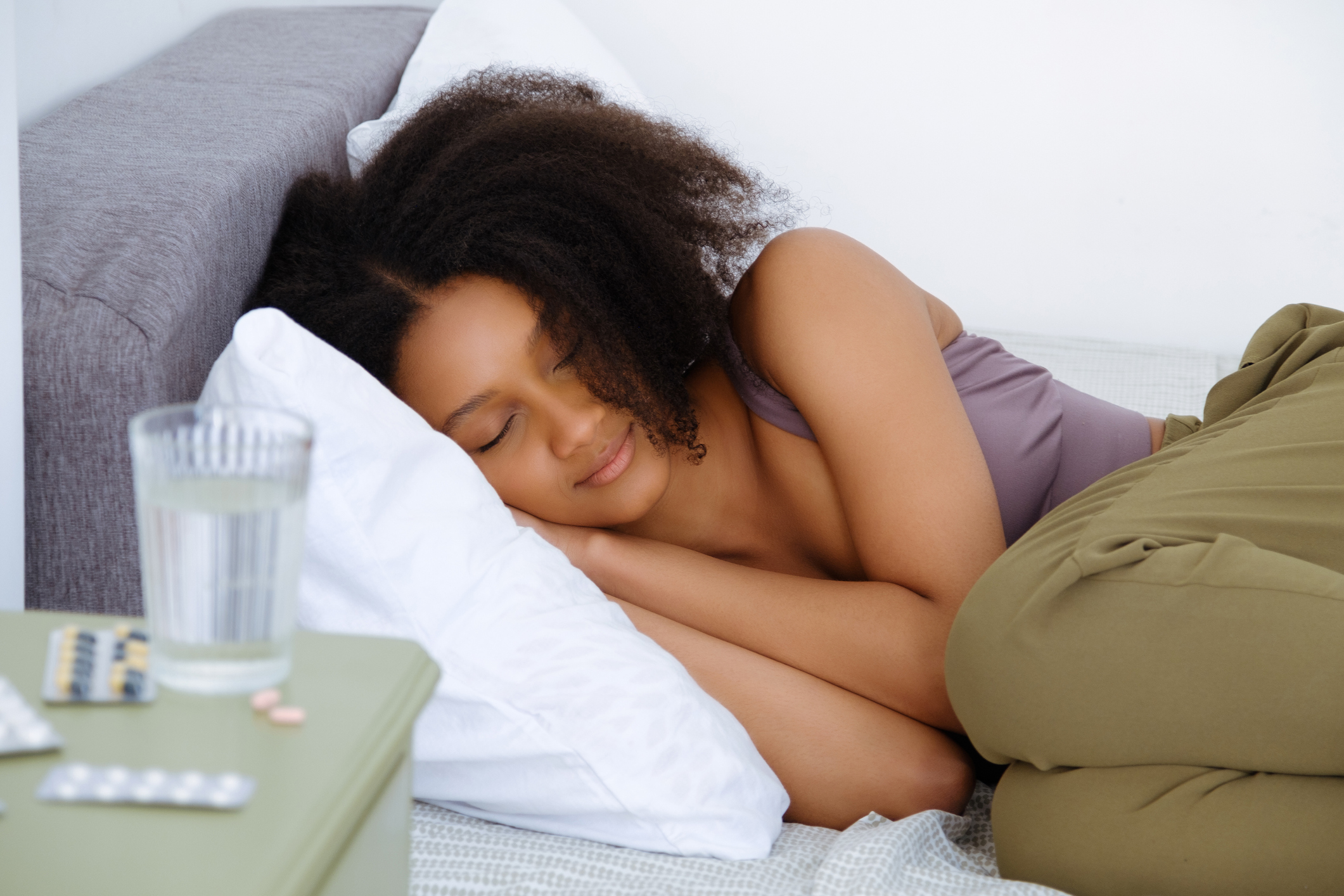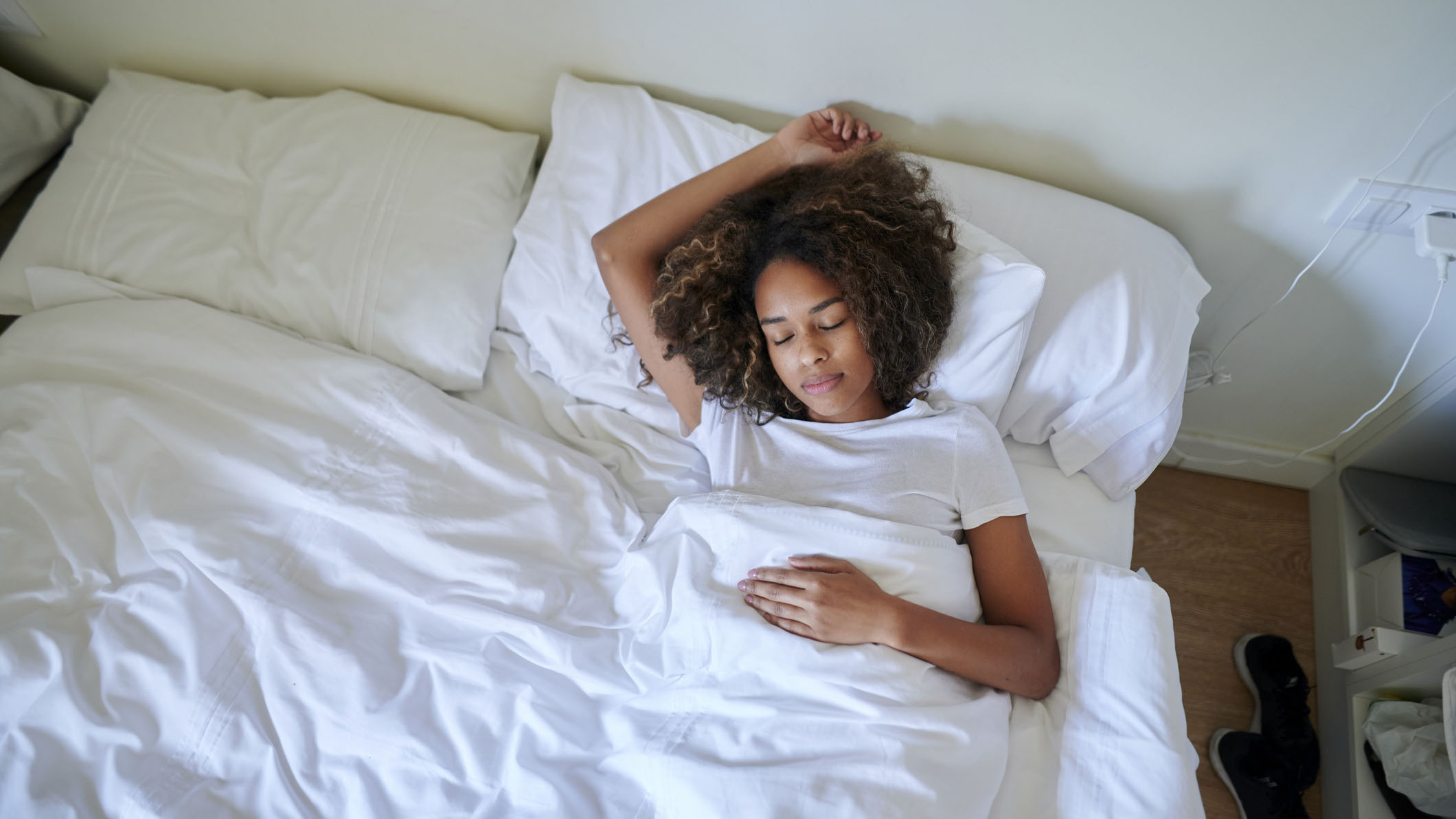Should you take melatonin gummies to fall asleep fast? Here's what a doctor thinks
Melatonin supplements can help you fall asleep faster, but they shouldn’t be your go-to sleep aid — here’s why

In our collective quest for better sleep, many of us are turning to melatonin gummies to help us fall asleep faster. Melatonin is a hormone humans produce naturally to tell our bodies that it’s time for sleep. However, a synthetic form of the hormone is available in the form of melatonin gummies, an over-the-counter sleep aid shown to reduce the time it takes to fall asleep.
But what are melatonin gummies and are they really safe to take? “Melatonin overall is considered safe so long as you are using it for the right reasons,” explains Dr. Sujay Kansagra, a double-board certified pediatric neurologist and doctor of sleep medicine at Duke University Medical Centre.
There is no standard melatonin dosage recommendation, as everyone has a different tolerance. It's easy to consume too much, which can cause side effects including dizziness, headaches, nausea and agitation.
Melatonin supplements can be an effective sleep aid for those suffering from certain sleep disorders, such as delayed sleep-wake phase syndrome, explains Dr. Kansagra.
As for the rest of us, we shouldn’t be reaching for melatonin gummies at the first sign of sleeplessness, maintains Dr Lindsay Browning, a UK-based sleep expert, chartered psychologist and neuroscientist. Instead, we should look at other ways of improving our sleep quality, like investing in the best mattress for our body and sleep needs and paying attention to our nighttime routines.
“Our bodies are perfectly capable of producing the right amount of melatonin and at the right time,” explains Dr. Browning. So let’s take a look at melatonin gummies and whether they could actually be harmful to our sleep.

Dr. Sujay Kansagra, MD, is the Director of Duke's Pediatric Neurology Sleep Medicine Program and an Assistant Professor in Duke's School of Medicine. He is board certified in both Pediatric Neurology and Sleep Medicine. He is a graduate of Duke Medical School and did a fellowship in Sleep Medicine at the University of North Carolina at Chapel Hill. Dr Kansagra can be found on social media via the handle @thatsleepdoc.

Dr Lindsay Browning, BSc MSc (Oxon) CPsychol AFBPsS, is a chartered psychologist, neuroscientist, sleep expert and author of Navigating Sleeplessness. Dr Browning founded her sleep clinic, Trouble Sleeping, in 2006 to help people improve their sleep, and can be found on all social media @DrBrowningSleep.
What are melatonin gummies?
Melatonin is a naturally occurring hormone produced by the pineal gland in the brain to help set our sleep patterns. In normal circumstances, melatonin levels spike in the evening, preparing our bodies for sleep by making us feel tired. Melatonin gummies, which are available in capsule or liquid form too, are a synthetic form of melatonin available to buy without prescription in the US.
While melatonin supplements are commonly used to tackle sleep disorders in shift workers and those suffering from jet lag, studies suggest that more of us than ever are taking melatonin habitually, including children and pre-teens.
Sign up to get the BEST of Tom's Guide direct to your inbox.
Get instant access to breaking news, the hottest reviews, great deals and helpful tips.
One 2022 study estimates that 24.7% of adults in the US regularly take melatonin supplements, which is five times as many as in 2018. Meanwhile, a 2023 study that surveyed the parents of 993 parents of children ranging from age one to 14 found that 20% of them regularly gave their children melatonin as a sleep aid.
Do melatonin gummies help you fall asleep fast?
Melatonin supplements can be an appropriate sleep aid for adults tackling certain sleep disorders or for shift workers adjusting to a new sleep-wake cycle. One study that explored the effectiveness of melatonin supplements for sleep disorders showed that they increased overall sleep time by an average of 12 minutes and eight seconds and reduced the time it took to go to sleep (sleep latency) by four minutes.

“We have good data to support use of melatonin if you want to help shift your circadian rhythm earlier for a disorder known as delayed sleep-wake phase syndrome,” explains Dr. Kansagra. “It is also helpful in treating jet lag in certain scenarios as well as helping shift workers manage their sleep."
However, it isn't a first-line treatment for insomnia. “There are other more effective options for treating insomnia such as cognitive behavioral therapy,” explains Dr. Kansagra. The main sleep disorders that melatonin can be useful for are:
- Jet lag
- Delayed sleep-wake phase syndrome
- Sleep disruption due to shift work
- Circadian rhythm issues due to vision impairment/blindness
Disclaimer: If you think melatonin supplements may help your sleep, always discuss it with your doctor before taking them.
Are melatonin gummies safe and in what dose?
Generally, melatonin supplements are considered safe to take in adulthood in low doses. A dosage of between 0.2 and 2mg is considered a low dose, with experts advising against exceeding 10mg of melatonin at a time.
However, there isn’t an industry standard dosage recommendation to adhere to. That means you could easily and unintentionally exceed the top-line recommendation of melatonin. This could lead to symptoms of nausea, dizziness and headaches.
According to the Centers for Disease Control and Prevention (CDC), the number of calls to poison control for pediatric melatonin overdoses rose by a staggering 530% from 2012 to 2021. Most of these calls were in relation to a child under the age of five who had ingested the gummies accidentally.
When buying a melatonin supplement, look for a bottle with a USP verification. This means that the product has been tested by the United States Pharmacopeia Convention.
It’s important to note that melatonin supplements are not fully regulated by the U.S. Food and Drink Administration (FDA). Without FDA regulation, manufacturers of melatonin supplements can put products on the shelves that are vastly different from one another, don’t contain melatonin at all, or include other ingredients not stipulated on the label.
A 2023 study that examined the contents of two dozen melatonin gummies found that some contained dangerous levels of the synthetic hormone, with one gummy exceeding the stipulated amount by 347% while another contained CBD oil and zero melatonin.
To ensure your melatonin gummies contain what they say they do (and without any hidden ingredients), look for a bottle with a USP verification. This means that the product has been tested by the United States Pharmacopeia Convention.
When should you take melatonin gummies?
Melatonin taken in supplement form has been shown to help reduce the effects of jet lag by syncing the traveler’s circadian rhythm, which is a series of internal body clocks that helps establish a regular sleep and wake time, in line with the new time zone. This is why it is helpful for those suffering from delayed sleep-wake phase syndrome.

However, the timing of your melatonin intake is just as important as dosage. “When we use melatonin as a ‘clock shifting’ medication, we know that the timing of dosing seems more important than the actual dose itself,” explains Dr. Kansagra. “You can often get by with very low doses (around 1mg) as long as you are timing it appropriately.”
How long do melatonin gummies last for?
Studies suggest that melatonin lasts up to five hours. It has a half-life ranging between 20 to 60 minutes, which means that after that time half of the melatonin taken will have been eliminated from the body. However, exactly how long melatonin supplements will stay in your system depends on the product (specifically what other ingredients may be included), dosage and your melatonin clearance rate.
Melatonin clearance rate describes the rate that you process melatonin and remove it from the body. Older adults, those with kidney or liver issues and young children will have a delayed melatonin clearance rate, which means melatonin levels will remain higher for longer. This could potentially lead to daytime drowsiness.
Can you overdose on melatonin gummies?
Melatonin might be a naturally-occurring hormone, but that doesn’t mean that melatonin gummies are harmless. Inaccurate labeling and a lack of clear dosage recommendations means that it’s possible to overdose on melatonin gummies, especially among children.
According to a study conducted by the CDC, over 4,000 children were hospitalized after overdosing on melatonin between 2012 and 2021. Five children required ventilation, and a further two children died as a result. In adults, symptoms of a melatonin overdose include:
- Dizziness
- Vomiting
- Headache
- Low or high blood pressure
As melatonin has a half-life ranging from 20 to 60 minutes for healthy adults, melatonin clears from your body relatively quickly. However, if you have underlying health issues that you are concerned about or your symptoms are worsening, seek urgent medical attention.
How many should you eat for sleep?
Unfortunately, melatonin gummies aren’t a quick fix solution to every sleep disorder. If you think that you could benefit from taking melatonin gummies, discuss it with your doctor first. It is generally recommended that you start off with a low dose (this can range between 0.2 and 1mg) and gauge your body’s tolerance.
The specific amount of melatonin gummies you consume will vary from product to product, so check the package carefully before taking. Keep in mind that melatonin supplements are not fully regulated by the FDA, which means that exact dosages and ingredients may vary from the label.
Instead, look for a melatonin supplement that has USP verification on its label. This means that the product has been tested by the United States Pharmacopeia Convention. This means that the melatonin supplement will contain the ingredients listed on the label, and in the declared potency.
How to boost melatonin levels naturally

Instead of reaching for the melatonin gummies, Dr. Browning recommends boosting your body’s own production of melatonin naturally. You can do this in the following ways:
1. Eat foods rich in melatonin
Foods that contain high levels of melatonin can help raise your own melatonin levels naturally. These include eggs, turkey, milk, fish, nuts (especially pistachios and almonds), as well as goji berries and cherries.
2. Limit tech use before bed
Melatonin levels begin to rise around two hours before bedtime, which is when you might experience the first signs of sleepiness. Work with, not against, these sleep-inducing signals by keeping the lights dimmed and swap scrolling on your phone for reading a book, as the blue light emitted from our tech screens suppress our body’s natural melatonin production.
If you can't live without your phone or other device, switch it to Night Mode or invest in some orange lens glasses to offset blue light pollution.
3. Boost sunlight exposure
Open your curtains as soon as you wake up — sunlight exposure first thing in the morning kick-starts your body’s production of the feel-good hormone serotonin. Later in the day, serotonin gets metabolized into melatonin, helping you to feel sleepier earlier.
Do you really need melatonin gummies?
Melatonin has been shown to be an effective sleep aid for those suffering from specific sleep disorders related to circadian rhythm disruption. For everyone else, Dr. Browning is keen to point out that melatonin is a naturally occurring hormone and that our body produces as much as we need.
“We are actually perfectly capable of biologically being alert and being calm if we do the right things,” says Dr. Browning. “But if we want to go a million miles an hour, and then just stop doing what you're doing and go to sleep immediately, it’s done pharmacologically.”

Nicola is the Sleep Editor at Tom’s Guide, where she helps steer the mattress and sleep content published on Tom’s Guide, including our Best Mattress for Back Pain buying guide. With a career in journalism spanning the best part of two decades, Nicola brings experience to the team and the knowledge of what makes a great article, whether that’s a how-to mattress cleaning feature, a deep dive into melatonin gummies, or an in-depth mattress review. As a sleep editor, few better understand how important a decent mattress is to the overall quality of our sleep, and precisely how our sleep impacts our physical and mental health. As well as tackling the vast topic of sleep, Nicola joins the raft of expert mattress specialists at Tom’s Guide, who test and compare a wide range of mattresses in order to guide readers towards the very best options on the market.
